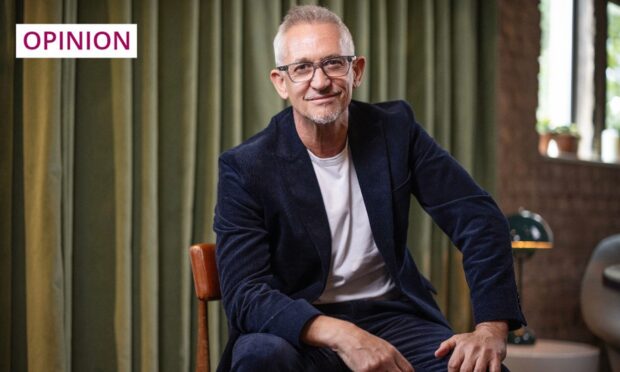When she was 15, my daughter announced that sports presenter and Walkers crisp ambassador Gary Lineker would be one of her future husbands. Possibly number two.
This was puzzling, given that Gary was already grey-haired with a ridiculous goatee beard. (Apologies, future son-in-law, but ask Santa for a Remington – it will take years off you.)
“You’re 15,” I said. “Aren’t you meant to be falling for rock gods with a drug problem?” She looked at me witheringly. Lineker was a political hero. He was also the highest paid presenter at the BBC, so the alimony would be good. “Besides,” she said, “there’s a lifetime supply of salt and vinegar in this.”
Obviously, I was proud of raising a girl of such pragmatic principle. Lineker’s outspoken nature drew her even more than the salt and vinegar. And, given that Johnny Depp was to be her first husband, her instinct for alternatives on the marital bliss front was sound.
Now, Lineker, who has had a history of clashing with BBC “impartiality” expectations, is being criticised again, this time for signing a letter calling for the UK Government to abandon its Rwanda plan. Reading this week about the case of 25-year-old homeless man Aaron McCarthy underlined why it is important that people with status use their power to defend those without.
McCarthy, the son of a drug-addicted mother who never knew his father, has been on the streets since he was 17. A video uploaded to social media shows him sitting outside a Nationwide bank on a London street. Next to it was a branch of McDonald’s with security guards posted at the door.
A guard asked him to move. McCarthy refused. Where would he go? In retaliation, the guard started slopping water round him with a mop, and, when that didn’t work, emptied the bucket onto the pavement, deliberately soaking McCarthy’s sleeping bag.
‘It made me feel like I was no one’
What enables a person to treat another human being like street trash that has blown in on the wind; human detritus to be washed away with the dirty water? The sense of entitlement a person carries is clearly not connected to how much they earn, but to inner values.
How much is a security guard at McDonald’s paid? Not much. Yet, there seems to be some innate need for people to create a hierarchy in which someone is below them. Is sense of self measured by how many people you can look down on? “It made me feel like I was no one,” McCarthy said afterwards.
Hi @McDonaldsUK. Do you think it is acceptable for your staff to soak the sleeping bags of homeless people in the middle of winter (or any other time of the year)? Disgusting behaviour. He wasn’t even outside your premises. @crisis_uk @Shelter #McDonalds #homelessness #london pic.twitter.com/HX8dFPbpV7
— Damon Evans (@damocrat) December 9, 2023
It feels increasingly that those who “have” are officially sanctioned in their denigration of those who “have not”. The language of the government in different contexts has set a tone that some people are losers and others simply don’t matter.
Achievement is all – but there is blindness about what it take to “make it”. Those who do link success to their own merit and hard work. They deserve it. What they often forget is their good fortune, their breaks, the helping hands along the way.
I once interviewed actress Joanna Lumley who spoke about the L’Oréal adverts for beauty products. They always end with “because you’re worth it”. Her inner voice, she admitted, always silently retorted: “No, I’m not.”
Life can turn unexpectedly – don’t look down on anybody
Recognition of your own good fortune is a healthy sign. Gary Lineker has, in the past, opened up his home to refugees to give shelter. “We need a new system that reflects the will of the British people who have opened their homes, donated and volunteered in their local communities,” he said. “That’s why I’m backing this new campaign – because fair really can begin here.”
The Tory party deputy chair Lee Anderson retorted that what people want is to stop the boats and tell “overpaid crisp salesmen to put a sock in it”. Anderson’s jibe belittles Lineker’s success but, should he find himself out of work, Lineker has offered to put in a word for him at the crisp factory.
I like my future son-in-law’s chutzpah, but his dig also highlights a central truth in all this: our lives are dependent on the vagaries of circumstance. You might look down on others, or sweep them out of your space because you don’t want to be bothered with them. But life can turn unexpectedly.
What Lineker has consistently argued for is the recognition of people’s humanity. Is that inconsistent with a job at the BBC?
Maybe the people Anderson mixes with are happy for others to be flown off to Rwanda out of sight, or washed away with the dirty washing-up water, but most decent people want a world that doesn’t dehumanise, stigmatise and humiliate the people who have least. They want some recognition that those of us who are not fleeing on boats, who are not living on the streets, who are not reduced to a plastic carrier and a damp sleeping bag aren’t superior. We’re just very, very lucky.
Catherine Deveney is an award-winning investigative journalist, novelist and television presenter


Conversation